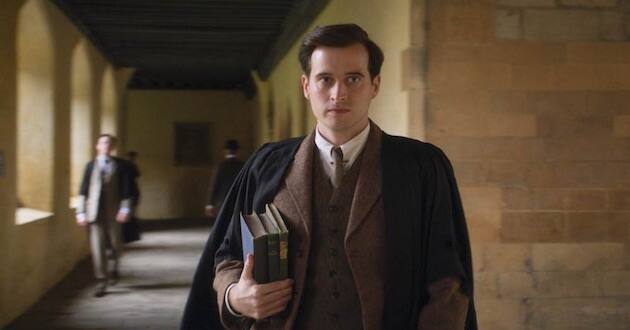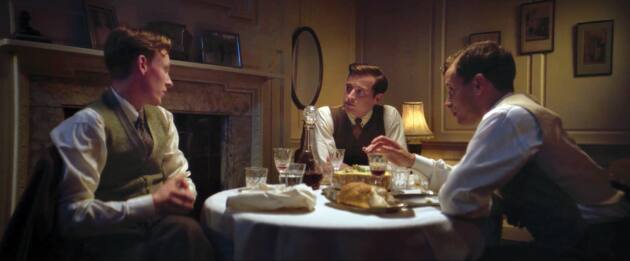Movie biopic of C.S. Lewis is brilliant and thoughtful

The Most Reluctant Convert is based on a successful stage play/monologue written by Max McLean. This filmed version features McLean as an elderly C.S. Lewis who walks viewers back through key dramatized moments in his younger years.
From age 9 to sometime in his late 20s, Lewis embarks upon a journey of impassioned feeling, thought and logic—losing his meager faith, becoming an ardent atheist and reasoned materialist. And then, slowly, he convinces himself—and us—that there is no truly reasonable choice but to turn to God.
This is a thoughtful, inviting movie and is anything but dry. For when the man on screen is a very well-portrayed C.S. Lewis—an individual of brilliant mind and fluent elocution—it becomes a nuanced experience worth having. And sharing.
The film also stars Nicholas Ralph as the younger Lewis and Eddie Ray Martin as Lewis as a child. The Most Reluctant Convert is directed by Norman Stone, who may be best known as the director of another film about C. S. Lewis, Shadowlands.
The experiences that formed the life of Lewis
Anyone who’s lived a bit of it can tell you as much. In fact, at times, life can be miserable: filled with pain, worry, loss and grief. And a young C.S. Lewis would privately wonder: Where is God in all of that?
In fact, if you had asked Jack, as he was called, about the subject—and then brought up the idea of an all-powerful, loving God—he would have sneered in your face. He had lost his beloved mother to cancer at age 9. Not long after that, really, he fought in a bloody world war as an older teen. So the idea of a Creator made of love, grace and goodness seemed ridiculous.
“At school, all the teachers and book editors took it for granted that religion was some sort of endemic nonsense into which humanity tended to blunder,” Lewis said. And as he read and studied and shaped his young life, he took that attitude and its cerebral hubris to heart.
How, then, did Lewis ever make the journey to an intellectual, rational acceptance of a faith that he so avidly rejected when he was young? How did God—a being who in Lewis’ mind couldn’t possibly exist—eventually transform his life? How did he become a celebrated Christian author and a champion of Christian apologetics?
The answer to those and other questions reside in a story that many have not heard: a tale of a most reluctant convert.
C.S. Lewis (whose variously aged iterations here narrate the story) helps us clearly understand all the many reasons he had (based on books and precepts of the world’s greatest thinkers) to reject God. But then, in turn, those thoughts and rationalizations help form a foundation for Lewis’ eventual Christian worldview. They, and his contemporaries such as J.R.R. Tolkien and Owen Barfield, lead Lewis to a rational, deep, explicit faith in Jesus Christ.
As a young man, Lewis begins working with an older tutor who challenges him to read deeply into the classics and always base his opinions on fact and substance—something that shapes the young man’s sense of reason and thinking going forward.
Lewis also, during a period—that Lewis calls his time of “spiritual lust,”—begins exploring things of the occult. This period illustrated the sense of spiritual longing that Lewis always felt but tried to fill in other ways. Eventually he recognizes how empty and destructive those choices are. Part of that realization occurs, he tells us, when he comes to the aid of a tormented fellow war veteran who screams into the night that he is being hounded by devils and dragged into hell.
In light of some of the above-mentioned elements, this film is designed to point out the way our loving Creator uses the stuff of a decidedly fallen world to draw a self-wounded mankind to Himself.
“I was angry at God for not existing,” an elderly Lewis says of his early days and thoughts. And then he lays out how his perceptions slowly changed. Many of the situations in his life mirror things we see happening in our current age, including a rejection of faith and narcissistic arrogance.
Lewis points out that as he sought out his core desires, he realized that he longed for something pure and beautiful in a corrupted world, a joy that was not within his power to gain or grasp. And that became a turning point in his spiritual journey.
“If I find in myself a desire that no experience in this world could satisfy,” Lewis reasons. “The most probable explanation: I was made for another world.”
Several thoughtful individuals, including a young J.R.R. Tolkien, speak clearly about their belief in God being something more than just baseless faith. Rather, they say it’s a reasoned belief based on the mountains of evidence that mankind’s own philosophers and poets have themselves pointed out.
The Most Reluctant Convert is perhaps one of the finest film biopics ever done of a Christian figure. That it’s of Lewis will no doubt re-invite adults to turn to his works once again and underscore why he has become somewhat of a hero to younger generations of believers.
The Most Reluctant Convert is playing in theaters nationally on select dates from Nov. 3 to Nov. 18. To find a theater in your area, visit cslewismovie.com. And if this story of C.S. Lewis’ life has whetted your appetite for more of his writing and story, be sure to check out Focus on the Family’s Radio Theater productions of The Chronicles of Narnia and C.S. Lewis at War as well.
The filmmakers’ commitment to showing Lewis’ Christian story is apparent in their website, which includes a workbook that your small group or family can use to discuss the biblical truths in his story.









